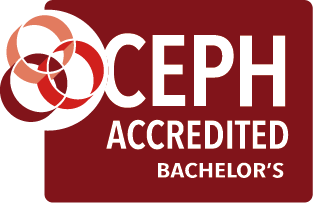Undergraduate Major & Minor
Public Health
ABOUT | SAS & SEBS STUDENTS | TRANSFER STUDENTS | MAJOR | MINOR | CERTIFICATES | JOINT DEGREES | CAREERS
B.S. in Public Health
The Bloustein School’s Undergraduate Public Health Program offers a dynamic learning environment that prepares public health students to tackle society’s most pressing contemporary health-related issues.
Our curricular goal is to assure that students graduate with the core skills and competencies needed to meet the public health challenges of the present and the future. Instilling these competencies requires an understanding of the interrelatedness of policy, planning, and health. We provide a liberal education rich in sciences and the humanities to promote an understanding of key public health principles.
Mission
- Recognizes the environmental and social context of public health including measures, education and policies that improve the health and wellness of individuals, families and communities;
- Nurtures critical thinking, analysis, and synthesis at multiple levels from the global to the local;
- Integrates interdisciplinary scholarship with application and practice that prepares students for future employment and professionalism; and
- Develops ethical and culturally competent leaders who embrace diversity and advocate to improve public health.
Vision
- To engage, inspire and prepare undergraduates as public health leaders.
Core Values
Our teaching-and-learning community values:
- Diversity, equity and human rights;
- Cultural responsiveness and agility;
- Collaboration and inclusion;
- Integration of methods, ideas, and disciplines;
- Shared and equitable responsibility for the mission of the program;
- Academic freedom;
- Diversity in academic contributions; and,
- Making a difference at the local and global levels as practitioners, policymakers and advocates.
Public Health Curriculum
The major in Public Health (832, 832D) prepares students for entry-level careers in population health and disease prevention. Public health professionals work in a wide range of services including infectious disease control; health problems of children, older adults, and the medically underserved; chronic disease management; health monitoring and surveillance; environmental/occupational health and safety; and emergency preparedness. Our students learn about the upstream factors that influence community health, particularly poverty, housing, work and unemployment, social exclusion, food security, transportation, access to health and social services, and evidence-based, data-driven decision-making.
Competencies Required to Earn the Bachelor of Science Degree in Public Health from the Edward J. Bloustein School of Planning and Public Policy
We adopt these foundational competencies from the Council on Education for Public Health: Upon the successful completion of our program, our public health majors will have the mastery to:
- Communicate public health information, in both oral and written forms and through a variety of media, to diverse audiences.
- Locate, use, evaluate and synthesize public health information.
In addition, the Public Health faculty of The Edward J. Bloustein School requires these program competencies for achievement of the B.S. Degree in Public Health from Rutgers University. A graduate of our program will be able to:
- Analyze how social determinants impact health disparities in different populations.
- Apply core epidemiological principles to understanding a health problem and discuss how this knowledge informs prevention efforts.
- Advocate to address a public health priority.

To request a copy of the accreditation documents, please email amana.kaskazi@ejb.rutgers.edu .
Council on Education for Public Health website: ceph.org
Notice of Third Party Comments Regarding Accreditation Review
Quick Links
Prospective Students
If you would like to schedule a virtual pre-advising appointment, please complete the Pre-Advising Request Form found here. Don’t want an appointment but need answers? Contact ugadmissions@ejb.rutgers.edu for assistance.
Declared Students
To request an advising appointment, please contact undergrad@ejb.rutgers.edu.
Undergraduate Student & Academic Services
Christina Torian
Assistant Dean of Undergraduate Education
Advisor for Prospective Students
Natashia James
Assistant Director of Undergraduate Student Services
Advisor for Students with Last Names A-F and all Student-Athletes
Alicia Nesser
Student Counselor, Undergraduate Student Services
Advisor for Students with Last Names G-O
Jessica Reyes
Student Counselor, Undergraduate Student Services
Advisor for Students with Last Names P-Z and all Veterans and Military-Affiliated Students

SAS and SEBS Students (832)
Students in the School of Arts and Sciences (SAS) and students in the School of Environmental and Biological Sciences (SEBS) seeking to declare the Public Health major must apply for admission to the major prior to declaring it.
Applicants must have a minimum grade of “C” or better in each of the pre-requisite courses and be in good academic standing. SAS and SEBS students can apply during one of our application cycles listed here.
Students are advised to declare the Public Health major no later than their first semester of junior year to ensure completion of the major by their anticipated graduation date.
Only courses with “C” or better may be counted towards the major, and students must complete the Core Curriculum requirements of their primary school. The degree is awarded jointly by the Bloustein School and SAS or SEBS.
Public Health is a credit-intensive major so the minor requirement is waived by SAS and SEBS. However, students are encouraged to complete a minor, even though they are not required to do so.
Prerequisites (12-15 cr)
- 355:101 Expository Writing (3)
- 775:205 Basic Statistical Methods (3-4) or equivalent (see approved equivalent statistics courses in Degree Navigator)
- One human biology course (3-4) (see approved human biology courses in Degree Navigator)
- One chemistry course (3-4)
- 160:127 Impact of Chemistry (3)
- 160:128 Chemistry of Life (3)
- 160:161 or 162 General Chemistry I or II (4)
Transfer (Direct Admit) Students (832D)
Transfer students seeking the Public Health major must have at least 30 credits before applying to the Bloustein School. Successful applicants will have completed the prerequisite courses with a grade of “C” or better, and have achieved an overall GPA of at least 2.5.
Current Rutgers students seeking a school-to-school transfer from another Rutgers unit, or students transferring to Rutgers from another college or university, must apply via the Office of Undergraduate Admissions. Contact ugadmissions@ejb.rutgers.edu for more information.
This program is designed to accommodate the needs of transfer, adult, and nontraditional students.
Transfer students from New Jersey community colleges are encouraged to complete lower-division prerequisite courses and the associate’s degree in order to benefit from the NJ Statewide Transfer Agreement.
Only courses with “C” or better may be counted towards program requirements. Upon completing the major, all General Education requirements, and a minimum of 30 credits at Rutgers (12 within the Bloustein School) with at least a 2.00 cumulative GPA, the student will receive the Bachelor of Science (BS) degree from the Bloustein School.
- 355:101 Expository Writing (3)
- 775:205 Basic Statistical Methods (3-4) or equivalent
- One human biology course (3-4)*
- One chemistry course (3-4)*
- 160:127 Impact of Chemistry (3)
- 160:128 Chemistry of Life (3)
- 160:161 or 162 General Chemistry I or II (4)
Public Health (832 and 832D) Major Requirements (46-47 cr)
Core (31 cr)
- 832:201 Principles of Public Health (3)
- 832:212 Introduction to Health Disparities (3) – Open to majors only
- 832:240 Global Health Perspectives (3)
- One of the following intensive writing courses (3):
- 775:300 Writing for Professionals (3)
- 832:339 Public Health Literature (3) – Prerequisites: 832:201 and 355:101
- 355:303 Writing for Business and the Professions (3)
- 355:302 Scientific and Technical Writing (3)
- 355:315 Writing Grant Proposals (3)
- 832:335 Epidemiology (3) – Prerequisites: Statistics or Pre-calculus and 832:201
- 832:356 Public Health Law and Ethics (3)
- 775:395 Research Methods (4) – Prerequisites: Open to majors only; 775:205 or equivalent statistics
- 775:450 Leadership Seminar (3) – Prerequisites: Open to majors only; min. 85 credits; Pre or Co-requisite Research Methods (10:775:395)
- *775:499 Professional Practice Internship (6) – Prerequisites: 832:395 or 775:395; and 832:450 or 775:450; and 100 credits; open to majors only
*Students seeking to replace 775:499 with 832:497, 498 Bloustein Honors Research (3, 3) should contact their advisor.
Required Electives: 15 credits of electives with course code 832, 9 credits of which must be at the 300-level or higher.
Students interested in select career paths should consider clustering their electives and seek advising early in their program of studies.
Public Health Minor
This minor is well-matched to majors in environmental policy, institutions & behavior; exercise science; food science; health administration; biological sciences; kinesiology & health; nursing; nutrition; psychology; social work; as well as clinical health tracks such as pre-medicine/dental.
Students seeking the public health minor must complete three core courses and five 832 elective courses in 832, excluding those designated for “majors only”.
- 832:201 Principles of Public Health (3)
- 832:212 Introduction to Health Disparities (3) or 832:240 Global Health Perspectives (3)
- 832:335 Epidemiology (3)
- Five electives with course code 832, three of which must be 300 or 400-level (15)
Public Health Certificate Programs
The Bloustein School offers a variety of Public Health certificates. Certificates are awarded only with, or subsequent to receiving a bachelor’s degree. Awarded certificates appear on the student’s final transcript. Students must declare their intention to pursue a certificate program with the Bloustein School prior to their last semester of study in order to qualify to receive a certificate.
Contact ugadmissions@ejb.rutgers.edu for more information.
Joint BA/MPH or BS/MPH Program
Exceptional, well-prepared students from any major with at least 60 credits and a cumulative GPA of 3.2 or better, and who wish to pursue graduate studies at the Rutgers School of Public Health are encouraged to seek advising about the Accelerated (BA/MPH or BS/MPH) program.
Contact ugadmissions@ejb.rutgers.edu for more information.
Careers
The Public Health program is offered through the Edward J. Bloustein School of Planning and Public Policy and leads to a Bachelor of Science (B.S.) degree. It provides students with a foundation in areas such as wellness and health promotion, disease and injury prevention, occupational and environmental health, health care delivery services and administration, epidemiology and population research and health threat preparedness and safety.
According to the U.S. Department of Health and Human Services, public health professionals work in a wide range of services including infectious disease control, community and global health services, biostatistics and informatics, chronic disease management, environmental/occupational safety, and emergency preparedness. The Public Health program prepares students for a broad variety of planning and management career paths in health care and disease prevention. These positions can be found in business, government, education, nonprofit, and health organizations. Continued study at the graduate level is also an option.
Regardless of your career choices, increase your marketability to employers through internships, research projects, service learning, related work experience, good grades and involvement in college activities.
